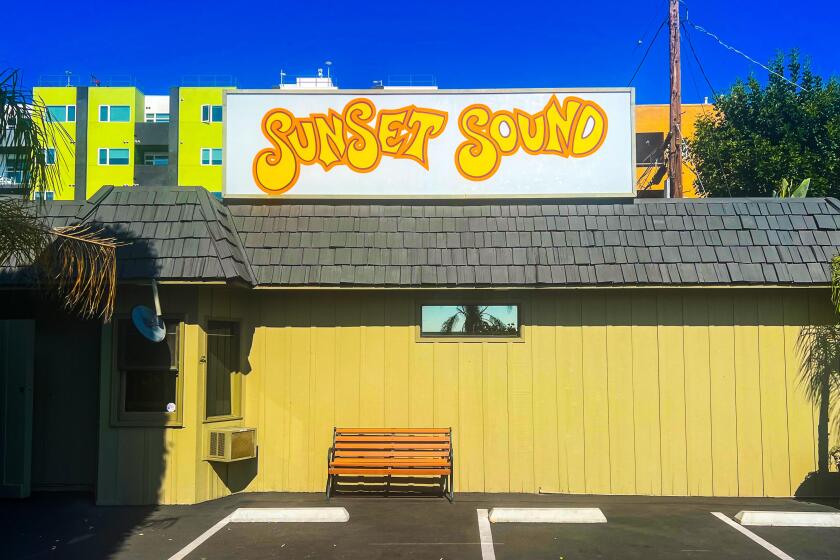
- Share via
In the summer of 2017, Chicano Batman played a free show at One Colorado, the shopping complex in the heart of Old Pasadena, as part of KCRW’s Summer Nights concert series. The band had just released “Freedom Is Free,” its third album.
Organizers had anticipated a large turnout for the event and warned fans for a week that they expected to reach capacity early.
The place was packed an hour before the band hit the stage. Fans arriving late, many of them Latino, climbed over and crawled under temporary fences installed for crowd control to try to get in to see the hometown heroes play their signature blend of Latin psychedelic, Chicano old-school soul and Tropicalía.
“That was some Beatles s—,” Eduardo Arenas, the band’s bass player, recalled with a chuckle.
“It was awesome because the power went out on the last song,” added lead vocalist Bardo Martinez over food at Highland Park’s breakfast taco joint HomeState.
“Power outages always make for a moment,” said Arenas.
Arenas and Martinez remember that evening of loosely controlled chaos fondly, but are quick to point out that it was a different era for the band, which recently released the new album “Notebook Fantasy” via indie label ATO Records.
Onstage, the band members have abandoned their matching three-piece ruffled suits — a nod to old-school Latin acts on both sides of the border— in favor of a “wear what you feel” dress policy. The quartet also became a trio; longtime drummer Gabriel Villa left the band after the release of 2020’s “Invisible People.”
Chicano Batman’s new record, “Invisible People,” is coming out during a pandemic. But they aren’t worried.
Notably, that experimental album, influenced by krautrockers Can and Nigeria’s William Onyeabor, was the first Chicano Batman album to not feature any songs in Spanish, an artistic decision that puzzled some longtime fans who expected the band to stay loyal to the “Chicano” part of its name.
Arenas sees it differently, arguing that the band was always meant to be an experimental project.
“We’re always trying to see where we can go next,” he said. “This is just part of the natural journey we’re on. I think it’s dope to have a fan base that believes in what we’re doing, and we can’t be the same people for 16 years, you know?”
Even the band’s name, which Martinez says he came up with while enrolled at UCLA in the early 2000s, allowed for interpretation and growth.
“I just put the two names together and thought, ‘Damn, that’s a dope band name,’” he said, adding that he drew inspiration from his own involvement in the school’s MEChA chapter. It was this political awakening that made him realize that there was no one way to be Chicano. “That was the whole point, that the band could be whatever we decided it to be.”
If “Invisible People” was a departure from the familiar, “Notebook Fantasy” is the arrival of what Chicano Batman was always meant to sound like.
Working with producer John Congleton, the band recorded at Sunset Sound, the legendary Hollywood studio used by some of the biggest names in rock history.
The legendary Sunset Sound studios in Hollywood is in trouble. If we care about music — its history and its future — we must take notice.
“We were in the same place where all these big bands — the Doors, Van Halen — recorded their albums,” said Arenas. “We were in the company of legends and the walls were talking to us.”
The ghosts of some of these legends show up in the recordings. The album’s first single, “Fly,” channels Prince — a Sunset Sound alumnus — through its upbeat funk and sexually charged lyrics. The track’s music video is also a visual throwback to the Purple One’s 1979 eponymous sophomore LP, which featured the musician shirtless on the cover.

“Notebook Fantasy” also marks the return of Spanish-language songs on Chicano Batman albums. “Era Primavera” is a slick, springtime ode to Latin America’s pop balladeers of the ‘70s and ‘80s that starts to bloom by the time it hits the chorus. Arenas takes over lead singer duties in “Hojas Secas” and gets self-reflective in this down-tempo track about the end of a relationship. His song of lament is accompanied by Carlos Arévalo’s wailing guitar, and crescendos with a full-on choir.
“We’re not trying to shy away from them,” Arenas said of their Spanish tracks. Rather, they’re just one of their many musical offerings. “It’s like ‘Yo, here’s your coconut chocolate, here’s your almond with sea salt and here’s your Carlos V [Mexican chocolate bar], we got you bro.”

“We were just trying to have fun in the studio, just geeking out on what potential sounds we could make,” said Martinez.
On Friday, Chicano Batman will take its vast musical samplings on tour, kick-starting a run of 32 U.S. cities in Las Vegas and ending with a homecoming show on June 29 at the historic Kia Forum in Inglewood.
“This journey to the Forum, it’s kind of a mammoth journey that involves everyone,” Arenas said before listing several local bands that came up with them and helped Chicano Batman become better musicians, including Brainstory, Chola Orange and Tropa Magica.
The other group that helped propel their journey: the fans, opinions and all.
“Chicano Batman at the Forum is not an individual act,” he added. “It’s a collective, a movement. You don’t play at the Forum without the people’s power, and so I’m thankful for that.”
More to Read
The Latinx experience chronicled
Get the Latinx Files newsletter for stories that capture the multitudes within our communities.
You may occasionally receive promotional content from the Los Angeles Times.








